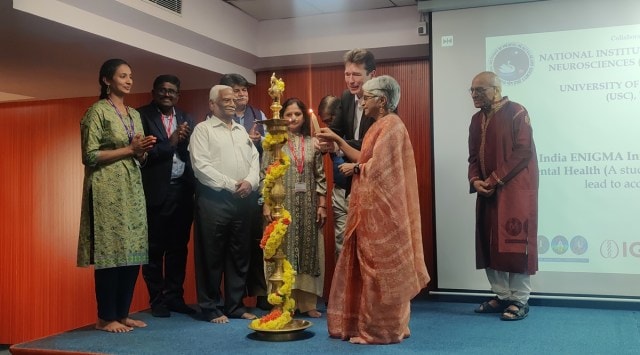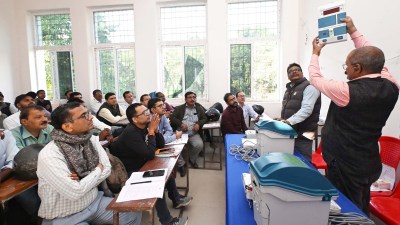Stay updated with the latest - Click here to follow us on Instagram
NIMHANS collaborates with University of Southern California to study brain ageing
The study will involve 400 voluntary participants including healthy older adults and persons with memory impairment.
 NIMHANS and University of Southern California (USC), United States of America Thursday launched their collaborative research project to study brain ageing. (Express Photo)
NIMHANS and University of Southern California (USC), United States of America Thursday launched their collaborative research project to study brain ageing. (Express Photo) The National Institute of Mental Health and Neurosciences (NIMHANS), Bengaluru, and the University of Southern California (USC), United States of America Thursday launched their collaborative five-year research project to study brain ageing.
The project ‘India ENIGMA Initiative for Global Aging and Mental Health’ aims at bridging the knowledge gap around the various factors influencing brain ageing. The insights of the study will be used to promote healthy ageing in older adults. The study will involve 400 voluntary participants including healthy older adults and persons with memory impairment.
The project has received a research grant of Rs 21 crore from the National Institute on Aging (NIA)/National Institutes of Health (NIH), USA and was approved by the union health ministry.
The Enhancing Neuro Imaging Genetics through Meta-Analysis (ENIGMA) consortium, headed by Dr. Paul M. Thompson, Director, Imaging Genetics Centre (IGC), USC, has brought together researchers who study major brain diseases, from around 40 countries. As part of the ENIGMA consortium, researchers are working on imaging genomics and using brain imaging and genetic data to understand brain structure, function and diseases.
Dr Thompson said, “Factors we presently know which promote brain ageing are obesity, high blood pressure, smoking, drug use and the ones which resist brain ageing are sound sleep, social activity and balanced diet among all.”
One of the many focus areas of the research includes detection of Alzheimer’s in a patient through blood tests, he said.
“By 2050, 20 percent of India’s population will be over the age of 60 and we must not forget that dementia is a growing concern. One of the reasons behind the increase in cases of dementia is because people are living longer. There are three diseases of brain ageing — vascular dementia, Parkinson’s disease and Alzheimer’s,” Dr Thompson added.
This study includes comprehensive assessment of risk and protective factors through clinical interview, memory and cognitive tests, blood investigations and brain imaging (MRI scan). The researchers will follow up with the 400 participants over two years to understand the contribution of these factors to the risk of developing dementia.
“The researchers aim to study the factors contributing to brain aging in the Indian population that can lead to an increased risk for Alzheimer’s dementia and other related disorders. In a person with dementia, the brain age (an estimate of the person’s age computed from brain imaging measures using magnetic resonance imaging (MRI)) may be ahead of their actual age (chronological age). This research will attempt to understand the multiple factors –psychosocial, lifestyle-related, genetic, amongst others, that can contribute to this ‘brain age gap’,” NIMHANS said in a statement.
Director of NIMHANS, Dr Pratima Murthy said, “Healthcare is moving fast towards health promotion, which is very important for common medical disorders like diabetes, hypertension, heart diseases as well as dementia and other neurological and psychiatric disorders. Insights from this study will substantially contribute towards health promotion and healthy aging in older adults.”
“Major medical breakthroughs have occurred in the past because of the generosity of participating volunteers. We hope that this study can generate critical insights for planning preventive and treatment strategies for dementia in the Indian population,” said Dr John P John, Professor of Psychiatry and Principal Investigator of this study at NIMHANS.
Dr G Venkatasubramanian, Professor of Psychiatry and Co-Principal Investigator of this study at NIMHANS said, “We expect to gain a much deeper understanding of the factors that lead to Alzheimer’s dementia through this study and request the wholehearted participation and support of patients and their families in this novel research initiative”.







